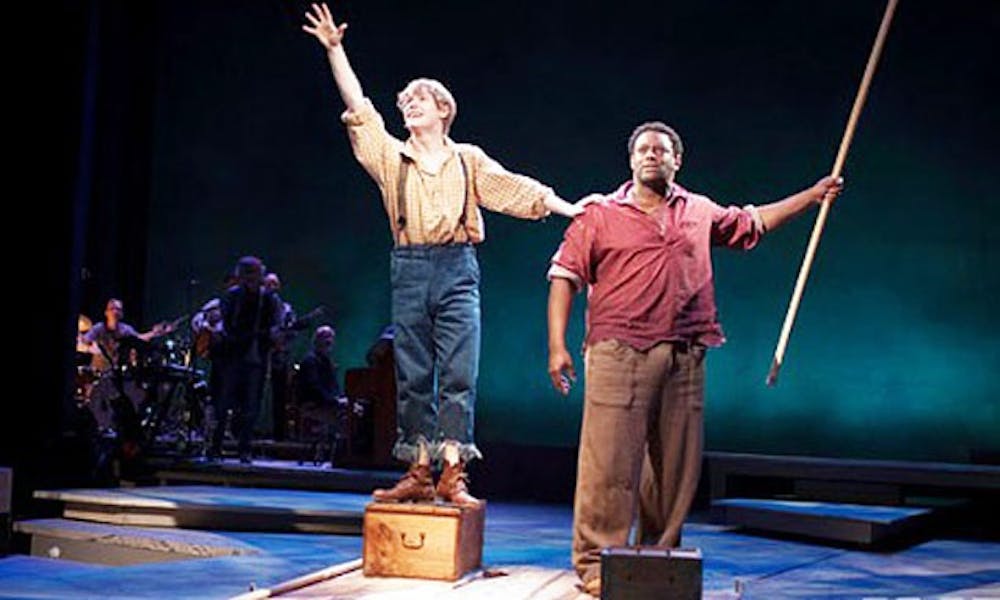Big River, the Tony Award-winning musical adapted from The Adventures of Huckleberry Finn, succeeds Angels in America to round out the PlayMakers Repertory Company’s 35th Anniversary season. Unlike the more graphic Angels in America, this interpretation of Mark Twain’s classic novel contains suitable levels of depth and fun for audience members of all ages.
Big River’s treatment of the human condition and morality is especially relevant in a modern context, apropos recent debate over the exclusion of the ‘N’ word from certain anniversary editions of Huckleberry Finn. Director Joseph Haj even defends the word’s inclusion in the playbill, stressing that its elimination would only “cost the story its ugly underside”—the unflattering aspects of human nature that Twain explores in the novel.
Twain introduces his text with a warning that persons attempting to find a moral, motive or plot in the novel will be persecuted, banished or shot. Big River starts with this same message, projected onto a stage display. And although it’s given tongue-in-cheek treatment in both cases, the “disclaimer” highlights the way in which Big River renders the book’s thematic content. Emphasizing dark wit in the script and exaggerated earnestness in the actors’ roles underscores the depravity present in much of the plot. Lines like, “I got mo’ money than I ever did. I owns myself. And I’m worth $800,” encapsulate this recurring duality of tone.
Given this M.O., Big River’s portrayals of Jim (David Aron Damane) and Huck (Jason Edward Cook) are dead-on. Damane is endearing and commanding on stage—his musical numbers tend to anchor the whimsy of the ensemble’s songs—while Cook’s role is less grave. The resulting chemistry comes across easily, even without the benefit of novelistic detail.
The musical’s successful recreation of antebellum Americana extends to stage direction, led by managers Charles K. Bayang and Sarah Smiley. PlayMakers’ thrust stage at times transforms from the symbolic Big Muddy to accommodate a dancing cast of close to 20.
The musical numbers are led by the bluegrass-infused country music of the Red Clay Ramblers, who contribute live fiddle, guitar, bass, drums and piano. Although the band is more than competent, they don’t shine in a theatrical context; apart from contributing an element of authenticity, they never pull equal weight with the acting or the lyrical content of the musical numbers.
But maybe that’s because the music, like the plot, is not given heavy-handed treatment. The success of Big River instead comes from its efficiency of song and dance as well as Haj’s ability to deftly intertwine elements of the novel, theater and music.
Twain’s opening note about the plotlessness—while sarcastic in the straightforward, Odyssean narrative of Huckleberry Finn—is slightly more literal in this context. Seemingly any juncture, whether grave or frivolous, is reason enough for song. But this is inevitable—perhaps integral—to the musical form. After all, Big River is a family play, entertaining enough to sustain interest both for keen young people and those well acquainted with the inspirational source.
Big River will run through April 24 at PlayMakers’ Paul Green Theatre at the University of North Carolina at Chapel Hill. Visit www.playmakersrep.org for tickets and performance times.
Get The Chronicle straight to your inbox
Signup for our weekly newsletter. Cancel at any time.

